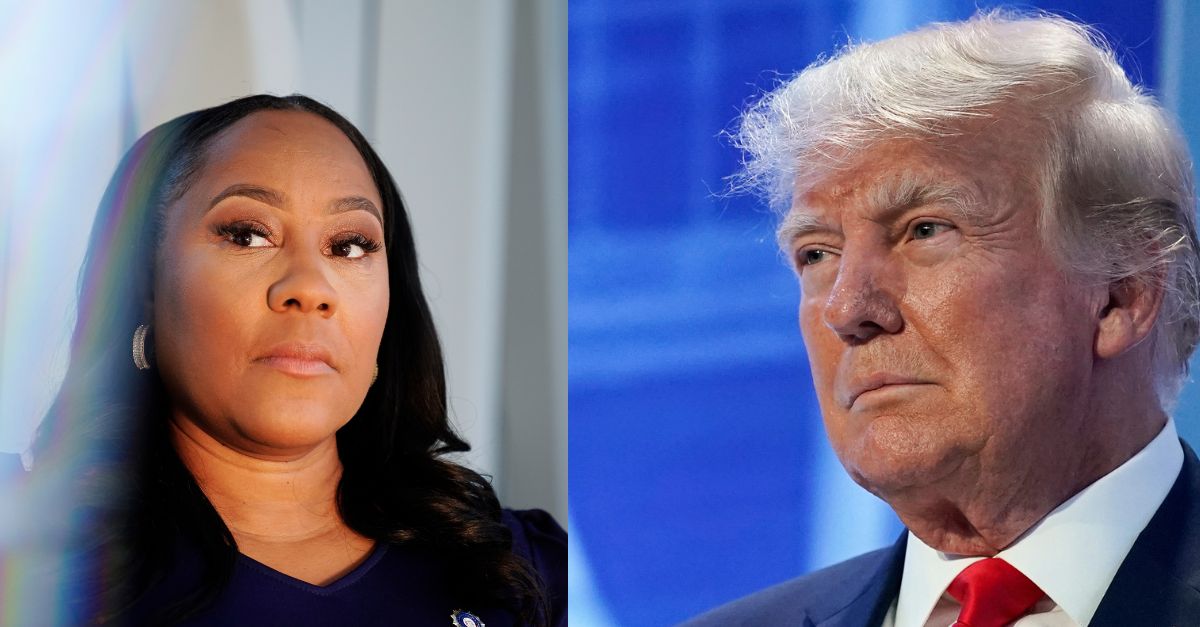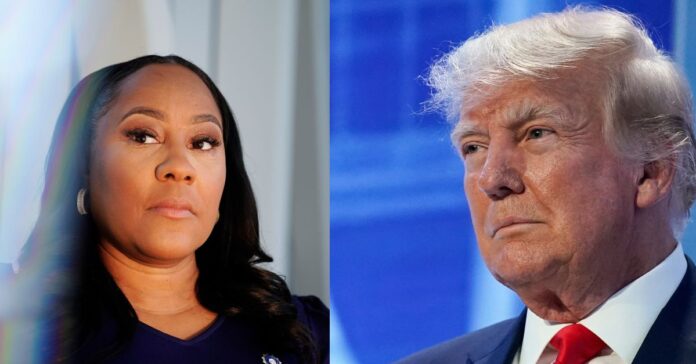
Left: Fulton County District Attorney Fani Willis; Right: Donald Trump (AP Photo/Brynn Anderson; AP Photo/Matt Rourke)
Cellular phone data suggesting that Fulton County District Attorney Fani Willis spent the night with special prosecutor Nathan Wade on two occasions and then lied about it under oath is admissible under the rules of evidence, a Monday defense filing argues.
The Georgia racketeering (RICO) case against former President Donald Trump remains sidelined by allegations the romance between Willis and Wade was both nepotistic and self-dealing.
Now, a tactic commonly used by law enforcement — including Willis herself — is being wielded against the district attorney’s office prosecuting the biggest criminal case in Peach State history.
Last week, Trump’s Atlanta-based defense attorney Steven Sadow filed a supplemental exhibit based on an analysis of subpoenaed cellphone records from AT&T. Some of that data simply showed around 12,000 interactions between the two prosecutors’ phones.
The more salient data in question, however, is referred to as “cell site location information” (CSLI). That location data indicates Wade was likely in physical proximity to Willis, at or near a house she rented from a friend, during the early morning hours — and for hours at a time — on two days in September and November 2021, the filing argues.
Notably, those two alleged overnight rendezvouses would have occurred well before Willis and Wade both testified their romantic relationship began. In court papers and testimony, the prosecutors have claimed their relationship did not become romantic until 2022.
Hours after Sadow moved to introduce the data collected by investigator Charles Mittelstadt, Willis filed a blistering objection — accusing the defense of violating the court’s order, the rules of evidence, and musing that the data may have been collected illegally.
In Trump’s 11-page reply, Sadow quickly dismisses the district attorney’s insinuation that any kind of law was broken — in a footnote that takes Willis to task for her knowledge of basic law.
“The State’s last-ditch claim on page 9 of its response that the defense obtained the cell phone records at issue illegally is patently frivolous,” the reply reads. “The records were obtained by valid subpoena issued to AT&T. As the State hopefully knows, defense counsel cannot apply for a search warrant and a subpoena does not require probable cause to be issued.”
The heart of the reply deals with the evidentiary issues.
In their objection, the state argued against admitting the cellphone data because it appeared the defense was trying to find a way around the rules that govern the introduction of expert testimony.
But, the defense explains, the Mittelstadt data is not expert testimony; nor does it rely on anyone’s opinion — but, rather, facts themselves. And, in Georgia courts, cellphone data is frequently admitted into the evidentiary record in criminal cases, the reply notes.
The Trump filing cites 11th Circuit precedent on point to support their argument. In that case, the government was able to introduce testimony about “cell towers and location of the phones” and a reviewing court allowed the testimony as “factual statements.”
“His testimony will mirror the testimony offered in Georgia courts and courts throughout the country: when one uses a cell phone either by texting, or calling/receiving a call, or by simply having the cell phone on so that it is constantly pinging, a cell tower nearby will receive and record the ping,” the reply reads. “This evidence simply shows the approximate location of the cell phones based on the nearby cell towers.”
As Law&Crime previously reported, Mittelstadt explained his CellHawk findings in an affidavit attached to Trump’s Friday motion:
[O]n September 11, 2021, Mr. Wade’s phone left the Doraville area and arrived within the geofence located on the Dogwood address at 10:45 P.M. The phone remained there until September 12 at 3:28 A.M. at which time the phone traveled directly to towers located in East Cobb consistent with his routine pinging at his residence in that area. The phone arrived in East Cobb at approximately 4:05 A.M., and records demonstrate he sent a text at 4:20 A.M. to Ms. Willis.
[O]n November 29, 2021, Mr. Wade’s phone was pinging on the East Cobb towers near his residence and, following a call from Ms. Willis [more accurately, from Mr. Willis’s phone] at 11:32 P.M., while the call continued, his phone left the East Cobb area just after midnight and arrived within the geofence located on the Dogwood address at 12:43 A.M on November 30, 2021. The phone remained there until 4:55 A.M
The state’s late Friday objection broadly disputes the relevance of the cellphone data. The response argues Mittelstadt fails to show Willis and Wade “were ever in the same place during any of the times listed” and argues evidence will, “in fact,” show the DA was “elsewhere” during “multiple relevant dates and times.”
Trump’s response points out that Willis did not directly dispute the cellphone data’s relevance to the two nights in question. Sadow also notes CSLI “is the same data that Fulton County District Attorney’s Office routinely relies upon to obtain convictions.”
The defense’s Monday reply goes on to say that Mittelstadt will not testify as an expert, or otherwise, about what the data suggests.
“He will offer no opinion; he will not testify as an expert, but only as a summary witness, explaining exactly what the records show,” the defense reply continues. “The prosecution will surely point out that nobody knows what was happening in the house between midnight and 3:28 a.m. on September 12, or between midnight and 5:00 a.m. on November 30. Mittelstadt does not claim to know. Neither does President Trump or any other defendant in this case. Only two people know. They are certainly the ones who should testify and say exactly what was happening on those occasions.”
But that doesn’t mean the defense itself won’t draw inferences.
The data supplied by Mittelstadt directly contradicts testimony offered in the case by Willis and Wade, the Trump filing argues.
“The witnesses in this case — both Wade and Willis — testified that their romantic relationship did not begin until March or April of 2022 and that they had never spent the night together prior to the Spring of 2022,” the defense reply reads. “The evidence offered by the defense to refute this testimony — the CSLI — is admissible.”
Georgia law does offer extremely wide latitude for the introduction of evidence that can be used to impeach a witness, the filing notes.
Earlier this month, both Willis and Wade testified they never spent the night together at the condominium in question.
“In short, the impeachment CSLI evidence can be introduced simply by offering the CSLI records that demonstrated that Willis and Wade spent two nights together on dates that contradicted their version of events concerning the inception of their romantic relationship and in contrast to their testimony that they never spent the night together at the Hapeville condominium,” the response says in summary.
Sadow goes on to explain that Georgia’s “liberal” evidentiary standards do not require “presumptive proof” to make a point. Rather, the standard for admissibility is whether a piece of evidence is more or less likely to establish a fact. And here, the defense argues, the same kind of evidence often used by Willis herself to convict criminals should be allowed for the purposes of impeachment.
“Given the testimony of Wade and Willis that they never spent the night together at the Hapeville condominium, the evidence — actual record evidence, not just an opinion or speculation — that proves that while talking on the phone with DA Willis, Wade drove from near his house to a location near her condo (if not exactly to her condo) at midnight, where he then remained for five hours — not once but twice in two months — qualifies as relevant evidence,” the filing goes on. “The cell phone records that show they were talking on the phone and then ended up at a location near or at her condominium for five hours makes more than just one fact more likely than not: (1) they spent the night together on those two occasions; and (2) their romance began before Wade was hired. One more fact is also more likely true than not: (3) neither of them testified truthfully at the hearing on February 15.”
The judge overseeing the case is unlikely to rule on the back-and-forth motions about the cellphone data any time soon.
Also on Monday, Fulton County Superior Court Judge Scott McAfee is slated to conduct a secret, in camera, hearing with Wade’s former divorce attorney, Terrence Bradley, and Bradley’s own counsel.
Bradley has been termed, by none other than McAfee, the “star witness” for the defense. He is the apparent, but not the lone, source for defense claims that Wade and Willis were romantically entangled well before the Trump investigation ever began.
Have a tip we should know? [email protected]

